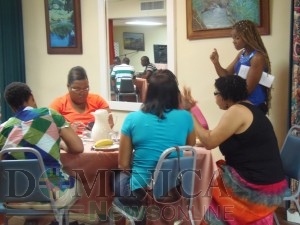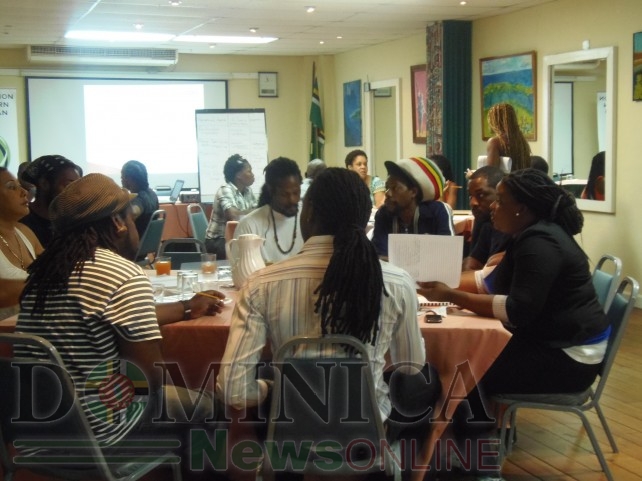
Participants of a two day workshop on business management for the creative industries sector, have given positive reviews to the workshop and say that they are now better poised to take their business proposals to the bank for funding.
The workshop, with the theme, ‘development of human capacity in the OECS Cultural Industries: Entrepreneurship, Strategic Development and Management (ESDM), was held on Friday Nov 22 and Saturday Nov 23, at the Garraway Hotel.
Speaking to DNO on Saturday, representative of the Dominica Calypso Association (DCA), Derrick ‘De hunter’ St. Rose, said the training taught him a lot in the space of a day and a half.
“The training has been going very good, and we are learning a lot of new things, a lot of good ideas are coming on board and my group and I are working on,” he said.
He said he is now able to do a proper project, “so we could approach some financial organization/ institution to give us the money.”
“Because if you haven’t done your project properly, it wouldn’t look appealing to the people you want to target…so if we can get to do that properly, and go with a good project and give them the reasons why we want to develop the young people and the benefits that can be derived from that, we should be able to source some funds,” he stated.
From Hunter’s standpoint, finance, not surprisingly, is the biggest challenge facing artists in Dominica. So, with what he describes as “a growing trend in the arts” in Dominica, he sees easier access to funds, facilitating the Dominica Calypso Association’s vision of forming forming a company aimed at developing “the young people, the young minds, educate them and hope to reap some financial benefits later down”.
Another participant, who is also a member of the Board of Directors of Eastern Caribbean Collective Organization for Music Rights (ECCO), McCathy Marie, also commended the workshop, because, he said, ” it reinforces the whole idea that music, and performing arts, and the creative industries are actually businesses that can generate income and wealth for persons. However, because it’s a business, you have to approach it in a business like way,”he said, pointing out that one must apply the same rules of a business in this industry “as you would any other industry.”
“You need to have managers, you need to have skills…a clear focus on what you doing and why you are doing it and where your revenue will come from and the expenses you will have is what the training is really about and how to overcome of course challenges any business will have,” Marie explained.
He added that a lack of understanding of how the business functions and where money comes from, is one of the areas that needs addressing in Dominica.
Foe newly-elected member of the Roseau City Council, Vanessa Prevost, whose background is in culture, heritage and the environment, what impressed her was the “wonderful ideas” which were discussed “in terms of how we can use culture to create jobs and create financial opportunities for persons.”
According to her, such a workshop is very important for Dominica and the OECS on a whole and “hopefully at the end of it we will have a few bankable projects which might be able to be implemented in Dominica and financed as well”.
So far this workshop has been held in St. Vincent and the Grenadines and plans are in place to cover the rest of the OECS member states in the first quarter of 2014.


Who organized this workshop and how can one get involved/invited to others?
I cannot believe that the main objective of the workshop was to be able to go to the bank.
Which bank? Definitely not those here!
If people who simply buy and sell goods cannot survive our banks, whoy be unto an artist.
Take the knowledge from the workshop but please do not go to the banks particularly the so-called development bank.
What the so called “Cultural Industries” of Dominica need is not so much a bank loan, but recognition of the importance of placing the creative arts on the agenda in schools.
At primary and secondary schools, art is not given the attention it deserves. On the list of subjects on offer, art is at the very bottom. In many schools, it is not there at all. Preference is given to academic subjects and the creative arts are sidelined. Many parents and teachers dismiss art as something you can do in your spare time, a bit like playing dominoes.
Results from the few schools that offer CXC in Art offer naught for your comfort.
Research has shown that 30% of students are creatively, rather than academically inclined. By not fostering their creativity we are neglecting a valuable resource. Art is a powerful regenerative force that can contribute considerably to the economy. A recent study in the UK has revealed that the cultural sector employs more people than banking and twice as many as motor manufacturing. Moreover, when we thwart creative expression it all too often becomes destructive.
By its very definition, creativity is something different to what has gone before. Hence it does not have the certainty of a bankable track record. From a lifetime’s experience in the creative arts, I consider a bank loan to be the very last thing that an artist needs to be burdened with.
The thing is, they will host workshops like these and give this kind of industry “hope” that something will eventually come out from it. 1. they need to start to support their artists, market their artist to the region and world and then they will be able to make the kind of money which is sufficient to live a reasonable daily life. Then again, we live in a kabbalist society therfore it is who know who kinda thing. 2. there is no way an artist should take a loan to maintain his craft because the sale of music and performances are here and there. Artists don’t make money by the month but rather by the season. 3. Mr. Burnett is right, if you judge a fish by it’s ability to climb a tree, it is going to live it’s entire live thinking it is stupid. We must engage students in situations that they can build upon and develop, a skill that is natural to them.
As much as I agree, there are many in society (me excluded) who believe that decent jobs cannot be made from Art. It is time that our artists prove society at large wrong and push forward with the creative ideas that are needed to drive our economy.
There are many ways in which art can be beneficial to business, especially in the areas of marketing where it not a benefit but a necessity to be creative.
Excellent observation.